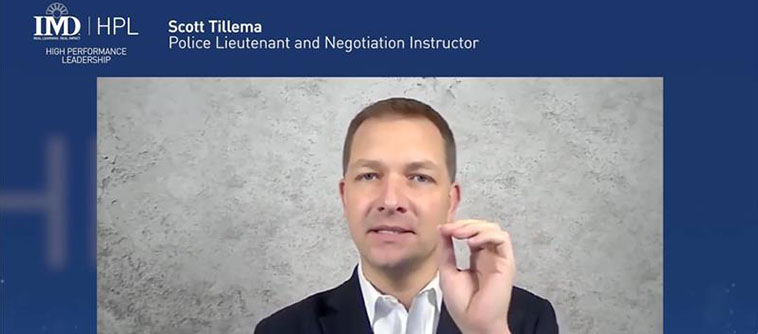Understanding, timing, delivery and respect are four areas that both hostage negotiators and leaders can focus on to improve their ability to bond and therefore their influence.
Whilst the two lines of work are very different, the skills used overlap.
The detail on how was given by police officer Scott Tillema as part of the Global HPL Alumni Event, Tillema being a graduate of the HPL program himself. He specializes in hostage negotiation and trains thousands of police negotiators across the US each year.
“Under pressure and stress you make decisions based on emotion,” he said. “Once you get more experienced in deescalating someone and exerting your influence it becomes more natural and powerful. But it takes a while.”
Out with the old, in with the accuracy
The concern with traditional staircase methods on creating the bonds needed is that we want to skip stairs to get to the top, he explained. He instead envisions the framework forming a circle, which represents the bond we create.
In both leading others and negotiating with a hostage taker, people can also fall prey to the type of thought patterns that say, “I think I know but actually I don’t know the whole story about this person.” So, keep an open mind and above all always ask, ‘But what if I’m wrong?’
When Tillema is called to a conflict management situation, in which a husband may have a gun to his wife’s head, say, he always wants to know three things:
- Who am I talking to?
- What do they want?
- Why do they want it?
But he doesn’t want vague answers: he wants accuracy.
“These are life or death decisions: we have to get it right,” he said, inviting listeners to consider the idea of handling their conflict management like it has those consequences. “If you do come to an impasse, always ask: what could I have done differently?”
An emotional understanding comes from piecing parts of the jigsaw together
One element to understanding a hostage taker is getting to grips with their overall state of being, which involves observing them on more than one level. Leaders can follow suit.
“Great negotiators are also good listeners. They connect with the emotions that are present, and what is behind them,” Tillema explained.
Leaders might wonder how they come across on camera and what it says about them. “When people are under stress they cover important parts of their body,” Tillema observed.
Words are powerful, but do not give words more importance than they deserve. “Words are only play a small part in what we believe. People lie. So find those other pieces,” Tillema said.
If there’s time to make time where a gun is involved, do it!
If you make the mistake of reacting, instead of acting, you’re teaching the hostage taker that pressure works. Apply that thought to your team.
More often than not, time is on your side. If the other party is getting angry, explore the emotion subtly, but don’t ask “why are you angry?” — this just triggers defensiveness.
Try instead: “You sound really angry now. How is that helpful to you?”
Asked about the tragic death of George Floyd at the hands of US police, Tillema said police need to do better and he is passionate about bringing negotiation and verbal influence training to every police officer across the country.
However, “Police use of force is sometimes appropriate,” he said. Unfortunately, there are instances where the actions of an offender do not allow time for de-escalation or negotiation.
People are often under more stress than we envisage, so ask “Is this person currently in a place they can receive my message?” Take the stressed hostage taker who is vomiting during negotiations as the extreme example. He is not yet in a position to process what we’re saying to him.
Experimenting with how you are coming across
The way you are perceived hinges on the rate, the rhythm, the pressure, the volume and the tone of your spoken words.
The same applies to everyone else and we can use it as a gauge of how much stress is — or isn’t — present.
Put simply, “Let’s eat, grandma” and “Let’s eat Grandma” convey a whole world of difference just because of a pause and a tweak to the intonation.
Be respectful, be fair
“If people believe they are being unfairly treated they get emotionally triggered,” stated Tillema, insisting on the power of a sentence crafted thus: “I am not sure I can get what you want today but I will listen to you and ensure you are being treated fairly.”
Often, we learn, that’s all people actually want: to be heard and to be treated well.
Linked to this is respect, part of which is allowing people the freedom to come to their own decisions — they will then be fully behind the work, as opposed to just thinking their leader told them to do it.
And remember, you are still part of the conversation until the door is closed or — in those tragic cases — the shot is fired.
